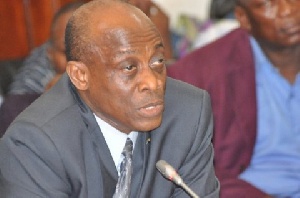Former Finance Minister Seth Terkper has made a strong case for government not to completely exit the International Monetary Fund (IMF) programme, as it could lead to overspending in subsequent years.
“I have expressed this view before, it’s been published. I believe rather than exit completely, we should take advantage of the policy support instrument of the programme, which is what Kenya, Rwanda and other African middle-income countries have with the IMF and that will afford us a smooth transition,” said Mr. Terkper.
Mr. Terkper was speaking at the Citi Business Festival’s ‘Economic Outlook’, themed ‘How beneficial has the latest IMF Programme been to Ghana?’, held at the University of Ghana, Legon.
Ghana in 2015 entered into an agreement with the International Monetary Fund for economic assistance. The deal was associated with an initial funding support of US$918million to be disbursed in eight tranches.
Some policy initiatives implemented under the programme include: freezing of public sector employment, reduction in the budget deficit, and zero-financing of budget deficits by the Bank of Ghana.
The programme, which was initially expected to last for two years, was in August 2017 extended by a year to end in December 2018.
Citing instances from other African economies, Mr. Terkper indicated that some African countries have tested the system under the Policy Support Instrument of the IMF, and it has enhanced fiscal discipline.
Mr. Terkper cautioned that signals sent by the current government on its desire to quickly exit the programme when it is over gives an impression that the country wants to go back to previous activities which have constantly taken Ghana back to the Fund.
He pointed out that it is important to look at past interactions with the Fund to inform government on how it will proceed going forward.
“Our affiliation with the IMF and the multilaterals span 1985 to 2000s, and you can see that was when our economic relations with the multilaterals including the World Bank, African Development Bank seriously started,” the former Finance Minister said.
He argued that the period between 2000 and 2010 could be described as a rapid expansion in services and in construction, when Services overtook Agriculture as the largest share of Ghana’s GDP.
Mr. Terkper stated that the country’s relationship with the IMF and multilaterals have proved positive, with sound policies which have propelled economic growth and development – adding that the country must continue to remain part of the Fund to avoid fiscal slippages.
Mr. Terkper urged government to revisit the methods used to refinance past government projects. “The issue is to borrow smartly; that is how come the phrase ‘Smart Borrowing’. How do other countries borrow smartly? That is the issue as far as I am concerned. We can learn from our own experiences, such as the Akosombo Dam paying for itself. Tema Harbour and others are good examples of projects paying for themselves,” he said.
A Deputy Minister of Finance, Charles Adu Boahene, indicated that government is putting in place measures to sustain fiscal stability after the country exits the IMF programme.
He assured that government is keen on reducing the fiscal deficit below 5 percent to avoid slippages.
President of the Private Enterprise Federation, Nana Osei Bonsu, was of the view that the programme has brought some hardship, as government was constrained from spending to expand the economy.
Professor Quartey stated that the IMF programme has brought some positive achievements in the country’s debt-reprofiling.
Business News of Tuesday, 3 July 2018
Source: thebftonline.com













